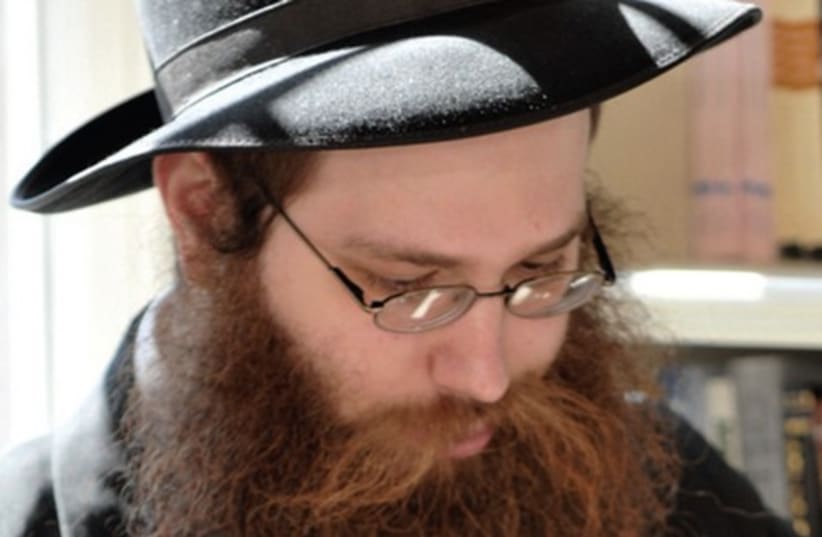whispering over and over again
the ten Divine utterances
that first gave birth to existence,
the way a child’s world is renewed
when he comes home from school
and his father and mother
still live in the same house,
and he hears them talking at the kitchen table.November was not born into a Hasidic family, nor is he a ba’al teshuva (newly observant). He was raised in an odd mix of American cities (Scranton, Richmond, Miami Beach and Kansas City) by Orthodox Jewish parents who moved around in their quest for suitable Jewish schools for their children. (November’s brother Baruch and his sister Deena are also poets.)The poet’s artistic inspiration grew out of the music he heard at home, the music of Bob Dylan, Paul Simon and Leonard Cohen. Cohen was his first major poetic influence, to be followed, when he was an English major at Binghamton University, SUNY, by luminaries such as Bly, Amichai, Akhmatova and Neruda.The poet Ruth Stone, his professor at Binghamton in 1999 and 2000, perhaps alluding to his fondness for translations, said then that his poems sounded like translations. In a way, they still do. Not translations from one language to another. Translations from a slower paced age of spiritually grounded empathy for man’s lonely journey on this earth.In “Shadows,” a poem about him and his wife before they married, he writes:I watched you
the way young men watch women
before they have loved them,
and I sent my shadow hungrily after you,
the way some send their shadows
when their bodies
cannot go.The ground November has carved out for himself, with its ethical, devotional and philosophical concerns, is rooted firmly in the world of Hasidism. He makes no compromises in subject matter to lure the non-Jewish, or even the non-religious Jewish reader. His poetry demands acceptance on its own terms.But it comes with openings for the spiritually skeptical to make their way through, to recognize the universal quality inhabiting November’s particularized landscape. Take, for instance, the poem “Climbing”:
This morning,
in the small basement shul
amidst several Chasidic students lost in
prayer,
I looked up from my siddur
to see a man in worker’s clothes climb a ladder
and enter through an open ceiling panel.
And I thought, Oh yes,
he is just another one
like all of us
trying desperately to ascend,
but knowing full well he must come back
down
to perform the work of this earth.November chose, at a crucial point in his own climb, to change ladders altogether. He was 23, married, and a graduate of the University of Pittsburgh’s MFA program in creative writing. Instead of venturing into a literary career as a writer/teacher, he all but abandoned reading and writing poetry for two years. He opted to become a student in Tiferes Bachurim, a Lubavitcher yeshiva in Morristown, New Jersey.He strongly considered becoming a rabbi, but one of his rabbis urged him to be a poet, a teacher of literature. He said that’s what the rebbe (the Lubavitcher Rebbe Menachem Mendel Schneerson, who died in 1994) would have wanted.Like the rebbe, the presence of absence can be found in November’s work:God, you have made it clear that this is a
religion of tests,
but in the books of mysticism
You have also whispered that all the while
You hide just behind the wall
waiting for us to pass.(from “A Religion of Tests”)Unlike other young poets who compensate for their youth by trying to be outrageously or cynically funny, November is serious without being heavy. It’s as if he parachuted straight into the sobriety of middle age, altogether bypassing youthful levity. Maybe years from now, humor, like a delayed season, will appear in his poetry.Does the broad pulse of interest in a book put out by a small company in Charlotte, North Carolina, have anything to do with the exotic nature of its author? Most likely it does. Few things are as compelling as otherness. Or more alluring than a seam in the otherness made by someone from there who comes towards you with something in his hand, something he wants you to see.For many in the Jewish literary world (and the Jewish secular world in general), the Hasid is the familiar stranger from the dark cloister of absolutes. Someone needing to be distanced from.Stylistically, there is great humility in November’s poems. It is one of their most appealing attributes. But it comes at the cost of tamping down their lyrical spine.The poem “Every Friday Night” begins with these lines:Every Friday night Jewish men walk home
from shul
and as they pass barber shops
and travel agencies
a Semitic sadness weighs on their shoulders
like a father’s coat on a small boy.The images in “Every Friday Night” don’t say, “Look at me.” They say, “Come with me. I want to show you something.”They remind one very strongly of New York’s great Jewish poet of the street, Charles Reznikoff (1894-1976). Reznikoff’s poems were also unadorned, deeply humanistic, deeply seen.This untitled poem by Reznikoff is dated 1969:
My grandfather, dead long before I was born,
died among strangers; and all the verse he
wrote
was lost –
except for what
still speaks through me
as mine.The dead are set down carefully beside the living in “God’s Optimism.” Every word of the poet is carefully connected. Carelessness may not be officially registered as a sin in Judaism, but it is avoided in November’s poems as if it were, as if a word mislaid, or unintentionally harmful, could throttle the holiness in things.Must one be spiritual to like November? It might seem so, but people who aren’t, do. November’s poems grow on you. Even if you recoil from the ideas of Hasidism it is hard to resist poetry that speaks to you with such quiet urgency.“God’s Optimism” is a first book written as though it were a last book.Robert Hirschfield is a New York-based freelance writer.
